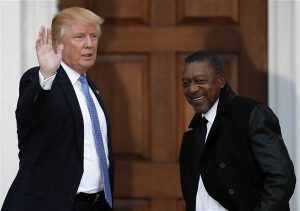(Akiit.com) There was fury when former BET founder and financial mogul Bob Johnson urged African-Americans to give President-Elect Trump a “shot” and “the benefit of the doubt.” Johnson was lambasted with a slew of printable and unprintable epitaphs from many blacks who raged at him for daring to say such a thing. Johnson didn’t damp down the anger when he claimed that that he turned down a Donald Trump offer of an administration post. The check list of anti-Trump reasons for their rage at Johnson for his “benefit of the doubt” admonition is by now well known.
In the weeks since his election Trump’s done absolutely nothing to change the perception that his administration will be a relentless foe of civil rights, public education and expanded health programs. He’s nominated a sworn enemy of civil and voting rights to the Attorney  General post, an avowed foe of public education to the education post, and has only slightly backed away from his plan to repeal Obamacare. So, what then what possesses Johnson to say Trump deserves a chance? Start with Johnson, he gave lots of money to Clinton. He made it clear that he backed her for president. But he’s rich, influential and corporate and politically well-connected. He’s among the one percent of businesspersons who Trump feels comfortable with, and surrounds himself with. He has the kind of access to Donald Trump that few blacks or anyone else not in the mogul’s class could even in their wildest dreams imagine.
General post, an avowed foe of public education to the education post, and has only slightly backed away from his plan to repeal Obamacare. So, what then what possesses Johnson to say Trump deserves a chance? Start with Johnson, he gave lots of money to Clinton. He made it clear that he backed her for president. But he’s rich, influential and corporate and politically well-connected. He’s among the one percent of businesspersons who Trump feels comfortable with, and surrounds himself with. He has the kind of access to Donald Trump that few blacks or anyone else not in the mogul’s class could even in their wildest dreams imagine.
The proof was Johnson’s face to face with Donald Trump and a purported offer of a job in his administration. It’s easy for Johnson to imagine that since Trump was willing to meet and talk with him he might be willing to do the same with other blacks. While that’s not exactly anyone’s idea of a diverse administration, it at least seems to hold out for Johnson anyway that future possibility.
Johnson didn’t say it, but Donald Trump did put on the policy table during the campaign what he brands a ten-point plan for blacks promising greater job creation, safe communities, business investment, and equal justice. Whether Trump means any of this is less important than that he put it on paper. This gives the appearance that he’s at least thinking about the problems of the inner cities and poses what he considers solutions to those problems. There’s just enough there for Johnson and an undetermined number of other African-American, particularly businesspersons, professionals, and ministers, to take a step back and wait and see if Trump goes anywhere with this plan. This is even more plausible considering that Trump made a better showing among black voters than Romney or McCain in their presidential bids. Legions of other blacks either didn’t vote for or raged at Clinton for her alleged political sins.
The far bigger reason that Johnson’s wants blacks to go easy on Trump for now is the brutal political reality. He’s the President. He will be in the Oval Office for at least four years. This is a classic case of real politick for Johnson; railing against Trump won’t make that go away. Some Democrats including reinstalled House Minority leader Nany Pelosi and other Democrats have admitted this blunt reality and have publicly announced that they will work with Trump on policy issues where there’s agreement and room for compromise rather than go to the barricades against him on every issue.
This brings it back to Johnson’s contention that Trump’s the president and he’s not going away. Therefore, its incumbent on African-American leaders and organizations to find possible areas of agreement with him on some issues. The greater goal being, if not to get an increase in job, health and education spending, then at least to prevent Trump from a wholesale hack up or scrap of these programs. This is not a new conundrum. Civil rights groups faced the same problem and dilemma with Reagan and W. Bush. Both were conservative Republicans who stacked their administration deck with many ultra-conservatives who had their sights set on gutting programs and were bent on a conservative overhaul of the federal government and the courts.
Civil rights groups had a dual approach to Reagan and Bush. They waged relentless battle with both administrations on voting rights, Supreme Court appointments, and against draconian slashes in health, education and jobs programs. At the same time, when the opportunity presented itself, they met with both presidents to keep the lines of communication open.
Johnson’s point here is that if you war with Trump or put your hands over your eyes and pretend he doesn’t exist, then that insures he’ll do the same with African-Americans. It’s certainly a valid point. The problem is that no matter how much of a chance Johnson and African-Americans give Trump, there’s no guarantee he’d ever return the favor. And much reason to think he won’t.
Columnist; Earl Ofari Hutchinson
Official website; http://twitter.com/earlhutchins









Leave a Reply